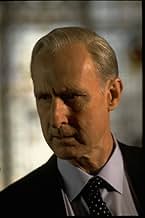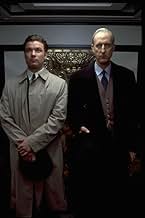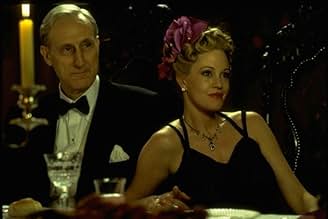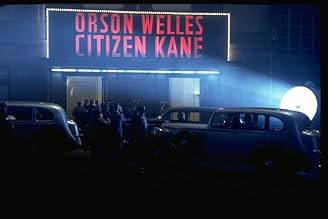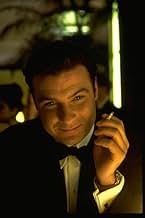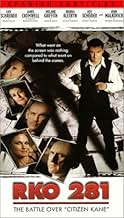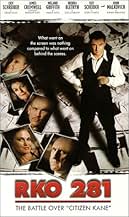IMDb-BEWERTUNG
7,0/10
6634
IHRE BEWERTUNG
Füge eine Handlung in deiner Sprache hinzuOrson Welles produces his greatest film, Citizen Kane (1941), despite the opposition of the film's de facto subject, William Randolph Hearst.Orson Welles produces his greatest film, Citizen Kane (1941), despite the opposition of the film's de facto subject, William Randolph Hearst.Orson Welles produces his greatest film, Citizen Kane (1941), despite the opposition of the film's de facto subject, William Randolph Hearst.
- Regie
- Drehbuch
- Hauptbesetzung
- 3 Primetime Emmys gewonnen
- 15 Gewinne & 28 Nominierungen insgesamt
Empfohlene Bewertungen
You've probably read a lot of other comments, so I'll spare you the details of what "RKO 281" is about.. rather, my comments pertain to made-for-HBO films, particularly this one..
HBO's movies always strike me as a cut above the usual made for the small screen fare, but just a notch below being theatrical quality. There's a strange feeling of being manipulated, that I get from almost all their films, especially biopics like this one, "Truman", and their latest "Path To War" which they're running this month. HBO likes to take on monumental, historical characters, like Orson Welles, Harry S Truman, and LBJ, but seems to always surround them with characters who are portrayed as being slightly dumb, and made to look like fools, on purpose. It's as though HBO is telling us to look back into history and laugh at how naive and silly people were in decades past.. look at the dumb clothes they wore, the silly hairstyles, their mannerisms, while at the same time idealizing them..
In these kinds of films, cars are never dirty or dented. People never flub their words when speaking to each other. Homes and offices are always a paragon of cleanliness. Everything looks brand new. Staged. Too perfect.. Okay, perhaps realism is not what we want in our movies.. we live in homes that have dirty dishes in the sink and rumbled towels in the bathroom, and stacks of magazines on the tables.. but there ARE period films in which the "lived in" look IS quite well done.. witness Bob Raefelson's "The Postman Always Rings Twice."
While the set and art direction of "RKO 281" is stunning, everything is beautiful to look at: all the vast, wood-panelled offices of the Hollywood moguls, somehow, everything has an artificial look to it.
And then, there's Liev Schreiber's portrayal of a young Orson Wells.. Again, sometimes HBO can create a convincing lookalike - Gary Sinese as Harry S Truman was right on the money, Michael Gambon as LBJ comes sort of close, but doesn't quite ring true, but Schreiber simply doesn't look or sound anything like Orson Welles did. Welles had a booming baritone voice, an in-your-face style of projecting his words, and a simply riveting screen presence. Schreiber's lack of a jaw, and his delivery simply never convinced me that this man was Orson Welles.. This is not to take away from Schreiber's acting abilities at all.. he was simply the wrong actor for the part. And since he is the centerpiece of the film, the entire film suffers because of his weak Welles clone..
However, "RKO 281" _is_ worth watching, if just for the lush sets and atmospherics, and the far too few glimpses we get of the making of "Citizen Kane." But again, HBO made this film as a drama, not a documentary, and a drama relies on conflict.. and thus the film concentrates on the clash of personalities, not the creation of the best film ever made..
HBO's movies always strike me as a cut above the usual made for the small screen fare, but just a notch below being theatrical quality. There's a strange feeling of being manipulated, that I get from almost all their films, especially biopics like this one, "Truman", and their latest "Path To War" which they're running this month. HBO likes to take on monumental, historical characters, like Orson Welles, Harry S Truman, and LBJ, but seems to always surround them with characters who are portrayed as being slightly dumb, and made to look like fools, on purpose. It's as though HBO is telling us to look back into history and laugh at how naive and silly people were in decades past.. look at the dumb clothes they wore, the silly hairstyles, their mannerisms, while at the same time idealizing them..
In these kinds of films, cars are never dirty or dented. People never flub their words when speaking to each other. Homes and offices are always a paragon of cleanliness. Everything looks brand new. Staged. Too perfect.. Okay, perhaps realism is not what we want in our movies.. we live in homes that have dirty dishes in the sink and rumbled towels in the bathroom, and stacks of magazines on the tables.. but there ARE period films in which the "lived in" look IS quite well done.. witness Bob Raefelson's "The Postman Always Rings Twice."
While the set and art direction of "RKO 281" is stunning, everything is beautiful to look at: all the vast, wood-panelled offices of the Hollywood moguls, somehow, everything has an artificial look to it.
And then, there's Liev Schreiber's portrayal of a young Orson Wells.. Again, sometimes HBO can create a convincing lookalike - Gary Sinese as Harry S Truman was right on the money, Michael Gambon as LBJ comes sort of close, but doesn't quite ring true, but Schreiber simply doesn't look or sound anything like Orson Welles did. Welles had a booming baritone voice, an in-your-face style of projecting his words, and a simply riveting screen presence. Schreiber's lack of a jaw, and his delivery simply never convinced me that this man was Orson Welles.. This is not to take away from Schreiber's acting abilities at all.. he was simply the wrong actor for the part. And since he is the centerpiece of the film, the entire film suffers because of his weak Welles clone..
However, "RKO 281" _is_ worth watching, if just for the lush sets and atmospherics, and the far too few glimpses we get of the making of "Citizen Kane." But again, HBO made this film as a drama, not a documentary, and a drama relies on conflict.. and thus the film concentrates on the clash of personalities, not the creation of the best film ever made..
Another reviewer already stated it very nicely. To enjoy this, you have to detach from thinking this is close to the truth. This is a dramatization and it is meant to tickle you, to tell a story. Sort of something Orson Welles liked to do. It is still based on certain things that happened while he tried making this major movie - for some even the best movie ever made. Whatever you think of Citizen Kane, you can't deny it's technical progress and thinking - how Welles used so many things to make a drama that touches on so many things.
Liev Schreiber is doing a fine job overall, though some might feel he could have been ... I guess crazier in his depiction. But we are supposed to root for our main character, so there goes that. Overall the acting is more than decent - especially for TV movies of that era. So if you are looking for light entertainment and are not up for the "real" documentary (which is Battle for Citizen Kane, which was an episode of a show), this will be more than fine enough a watch. If you are already aware of certain things it might help enjoy the movie - but as I initially said, you may also be annoyed by what the movie chooeses to show. Drama will be drama .. you need a bit of suspense sometimes
Liev Schreiber is doing a fine job overall, though some might feel he could have been ... I guess crazier in his depiction. But we are supposed to root for our main character, so there goes that. Overall the acting is more than decent - especially for TV movies of that era. So if you are looking for light entertainment and are not up for the "real" documentary (which is Battle for Citizen Kane, which was an episode of a show), this will be more than fine enough a watch. If you are already aware of certain things it might help enjoy the movie - but as I initially said, you may also be annoyed by what the movie chooeses to show. Drama will be drama .. you need a bit of suspense sometimes
The key to enjoying this film is in being able to divorce yourself from the idea that this is an accurate representation of the making of Citizen Kane. RKO 281 as a stand-alone film is not bad, though the short running time left me feeling like I'd only seen the primary colors of what could've been a rich piece of fiction.
And it does feel more like fiction than truth.
Watching RKO 281 as a Welles enthusiast was a struggle. Welles himself was such a unique *presence*, a magician in more ways than one, and Liev Schreiber just doesn't evoke the god-like charisma and fury that were manifestations of Welles' particular genius. I would've preferred Vincent D'Onofrio (who pulled off an excellent Welles in Ed Wood after only two weeks of preparation) or even Oliver Platt. It is important to get the "character" of Welles RIGHT in a movie about his masterpiece. If RKO 281 failed egregiously on any level, it's this one.
Though this film is about the MAKING of Citizen Kane, it doesn't address why Citizen Kane had such an impact later in its life. We know that Welles had to fight very hard to save his picture against a variety of political agendas. However, a hard-won battle does not a classic film make...on its own. The only clues we get from RKO character Welles are his passionate and other-worldly exclamations along the lines of, "I just KNOW this is the MOMENT for this story!--Everything I AM is in this film!", etc. It's too mystical for me, and I think it does an injustice to the efforts of Welles and his collaborators to suggest that it was simply the luck (and maliciousness towards Hearst) of a spoiled boy wonder that made what is widely considered to be the best movie of all time.
Welles was in a unique position during that era. He had carte blanche in the movie studios--a status unprecedented before or since--and had the means to create his vision fully to his specifications. Getting the picture *released* was nothing short of a miracle, however, and I think it would've been interesting to dive into yet another layer of what Citizen Kane represents: Art for Art's sake. It's heartbreaking to note that Welles' subsequent film The Magnificent Ambersons was butchered beyond recognition by the studio--those who were fortunate enough to view Welles original (and now lost) cut thought that Ambersons was his true masterpiece, that Citizen Kane was merely a warm-up (!!!). Can you just imagine what this man could've accomplished if only...?
Which brings me to William Randolph Hearst. RKO 281 barely scratches the surface of how powerful Hearst was at the time. The residual effects of his attempt to stop Citizen Kane's release were felt by the film industry (and by Welles in particular) for many years after, and I would've liked to see the nature of this confrontation more clearly.
I've often said that Citizen Kane was Orson Welles' bane and salvation, for we see in hindsight that he sacrificed himself (and ultimately his future)
to earn a beautiful and tragic place in cinematic history. Overall, I wanted an edgier, darker, and more complex account of RKO 281. If I remove all pre-conceived notions and expectations, I find that this docudrama is interesting and fun to watch, but ultimately, I cannot help being drawn back to what made this 1999 film possible: the tumultuous triumph of a long-shot movie as envisioned by a temperamental, inexperienced genius. There are many shadowy folds to the real story of Citizen Kane, and RKO 281 feels like a bowl of plastic fruit in comparison.
And it does feel more like fiction than truth.
Watching RKO 281 as a Welles enthusiast was a struggle. Welles himself was such a unique *presence*, a magician in more ways than one, and Liev Schreiber just doesn't evoke the god-like charisma and fury that were manifestations of Welles' particular genius. I would've preferred Vincent D'Onofrio (who pulled off an excellent Welles in Ed Wood after only two weeks of preparation) or even Oliver Platt. It is important to get the "character" of Welles RIGHT in a movie about his masterpiece. If RKO 281 failed egregiously on any level, it's this one.
Though this film is about the MAKING of Citizen Kane, it doesn't address why Citizen Kane had such an impact later in its life. We know that Welles had to fight very hard to save his picture against a variety of political agendas. However, a hard-won battle does not a classic film make...on its own. The only clues we get from RKO character Welles are his passionate and other-worldly exclamations along the lines of, "I just KNOW this is the MOMENT for this story!--Everything I AM is in this film!", etc. It's too mystical for me, and I think it does an injustice to the efforts of Welles and his collaborators to suggest that it was simply the luck (and maliciousness towards Hearst) of a spoiled boy wonder that made what is widely considered to be the best movie of all time.
Welles was in a unique position during that era. He had carte blanche in the movie studios--a status unprecedented before or since--and had the means to create his vision fully to his specifications. Getting the picture *released* was nothing short of a miracle, however, and I think it would've been interesting to dive into yet another layer of what Citizen Kane represents: Art for Art's sake. It's heartbreaking to note that Welles' subsequent film The Magnificent Ambersons was butchered beyond recognition by the studio--those who were fortunate enough to view Welles original (and now lost) cut thought that Ambersons was his true masterpiece, that Citizen Kane was merely a warm-up (!!!). Can you just imagine what this man could've accomplished if only...?
Which brings me to William Randolph Hearst. RKO 281 barely scratches the surface of how powerful Hearst was at the time. The residual effects of his attempt to stop Citizen Kane's release were felt by the film industry (and by Welles in particular) for many years after, and I would've liked to see the nature of this confrontation more clearly.
I've often said that Citizen Kane was Orson Welles' bane and salvation, for we see in hindsight that he sacrificed himself (and ultimately his future)
to earn a beautiful and tragic place in cinematic history. Overall, I wanted an edgier, darker, and more complex account of RKO 281. If I remove all pre-conceived notions and expectations, I find that this docudrama is interesting and fun to watch, but ultimately, I cannot help being drawn back to what made this 1999 film possible: the tumultuous triumph of a long-shot movie as envisioned by a temperamental, inexperienced genius. There are many shadowy folds to the real story of Citizen Kane, and RKO 281 feels like a bowl of plastic fruit in comparison.
10majikstl
The most remarkable thing about RKO 281 (subtitled "The Battle Over Citizen Kane") is that not only is it sympathetic to William Randolph Hearst and his paramour Marian Davies, but it also paints a less then flattering picture of film icon Orson Welles.
Every film buff worth his popcorn knows, or at least should know, the legend of CITIZEN KANE: Welles, the brilliant, but naive Boy Wonder, takes Hollywood by storm with his amazing and groundbreaking first picture, but falls victim to the tyranny of the cruel, thin-skinned billionaire Hearst, who tries to destroy the brilliant work of art. It is the David and Goliath saga of Tinseltown, with an art triumphs over commerce subtext. But the makers of this made-for-cable drama have opted to pull a switcheroo. Just as Welles bravely (or foolishly) challenged the legendary tycoon Hearst, RKO 281 rather courageously takes on the Welles legacy of the misunderstood genius. The results are gratifying, though the facts end up blurred all the more.
If there is, indeed, a villain in the whole CITIZEN KANE affair it would be screenwriter Herman J. Mankiewicz (played here by John Malkovich), who acted as Judas to W.R. and Marian, while serving as Iago to Welles's Othello. It was, according to historians, Mankiewicz who took a catalogue of firsthand observations and casual gossip gathered as a favored houseguest of the Hearst household and fashioned it into an unauthorized biography/screenplay. And it was Mankiewicz who goaded Welles to flirt with professional suicide by pursuing the project in the first place and by changing a film about a generic millionaire into a tale rife with details specific to Hearst.
But RKO 281 ventures a different theory, suggesting that Welles devised KANE as an elaborate weapon of revenge against Hearst for having been insulted at a dinner party. One suspects that Welles' crime was more one of clueless indifference than vengeance, but the latter does make the film more dramatically provocative. Whatever the case, Welles clearly bit off a much bigger bite than he anticipated when he deemed Hearst's personal life fair game.
Ironically, Welles' folly may not have been his audacity to attack Hearst, who surely faced greater critics, so much as the director's unintended assault on innocent bystander Davies. What RKO 281 highlights is that much of Hearst's ire against KANE was based to his desire to protect Davies from an unflattering portrayal and public scandal; not an unfounded fear, it would appear. In KANE, Hearst is presented in a mostly sympathetic light, and it is Davies who comes off the worst. Indeed, her alter ego, Susan Alexander is the film's least likable and empathetic character, an exceedingly dumb blonde who evolves into a shrieking, untalented alcoholic has-been diva. No other character in the film is as cruelly one-dimensional. Ironically, it may have been Mankiewicz's gallant, albeit foolish, attempt to protect his friend Davies, that caused all the problems. By making Susan so extremely different from the much beloved Davies, Mankiewicz may have thought people would see Alexander as a pure fiction. But such is the power and fame of KANE that then and future generations were destined to accept the legend over the reality and assume that Susan and Marian are one in the same. (Further irony: RKO 281 finds Marian played by a very Susan Alexander-like Melanie Griffith.)
Though the film notes the irony of the muckraker publisher suddenly finding himself the victim of the type of tabloid journalism that made him famous, RKO 281 is mostly sympathetic to Marian and W.R., who are seen as the ones under attack. As played by Liev Schreiber, Welles is the film's villain, who, filled with arrogance and ambition, sweeps into town with an itch to make a reputation for himself and a willingness to exploit others to do so. His petty, pseudo-socialist rantings about the evils of the very rich seem hollow in light of his ambitious desire to exploit others fame and reputation to make a name for himself. It is a different, unflattering side of Welles, who is usually seen as the perpetually embattled artist.
Yet, the plot takes another twist. Welles discovers that Hearst in particular and Hollywood in general weren't willing to just kowtow to his genius and like George Amberson Minafer in his THE MAGNIFICENT AMBERSONS, The Boy Wonder gets his comeuppance. Welles becomes just as much the victim of his arrogance as RKO, Hearst, Davies and Mankiewicz.
RKO 281 is a slick and entertaining effort, but it does miss a golden opportunity. The film would have been so much better had it invented its own "Rosebud" to search for and imitated CITIZEN KANE's ambitious visual style and confessional mock-documentary narrative drive. RKO 281 is a very conventional movie about a very unconventional film.
Every film buff worth his popcorn knows, or at least should know, the legend of CITIZEN KANE: Welles, the brilliant, but naive Boy Wonder, takes Hollywood by storm with his amazing and groundbreaking first picture, but falls victim to the tyranny of the cruel, thin-skinned billionaire Hearst, who tries to destroy the brilliant work of art. It is the David and Goliath saga of Tinseltown, with an art triumphs over commerce subtext. But the makers of this made-for-cable drama have opted to pull a switcheroo. Just as Welles bravely (or foolishly) challenged the legendary tycoon Hearst, RKO 281 rather courageously takes on the Welles legacy of the misunderstood genius. The results are gratifying, though the facts end up blurred all the more.
If there is, indeed, a villain in the whole CITIZEN KANE affair it would be screenwriter Herman J. Mankiewicz (played here by John Malkovich), who acted as Judas to W.R. and Marian, while serving as Iago to Welles's Othello. It was, according to historians, Mankiewicz who took a catalogue of firsthand observations and casual gossip gathered as a favored houseguest of the Hearst household and fashioned it into an unauthorized biography/screenplay. And it was Mankiewicz who goaded Welles to flirt with professional suicide by pursuing the project in the first place and by changing a film about a generic millionaire into a tale rife with details specific to Hearst.
But RKO 281 ventures a different theory, suggesting that Welles devised KANE as an elaborate weapon of revenge against Hearst for having been insulted at a dinner party. One suspects that Welles' crime was more one of clueless indifference than vengeance, but the latter does make the film more dramatically provocative. Whatever the case, Welles clearly bit off a much bigger bite than he anticipated when he deemed Hearst's personal life fair game.
Ironically, Welles' folly may not have been his audacity to attack Hearst, who surely faced greater critics, so much as the director's unintended assault on innocent bystander Davies. What RKO 281 highlights is that much of Hearst's ire against KANE was based to his desire to protect Davies from an unflattering portrayal and public scandal; not an unfounded fear, it would appear. In KANE, Hearst is presented in a mostly sympathetic light, and it is Davies who comes off the worst. Indeed, her alter ego, Susan Alexander is the film's least likable and empathetic character, an exceedingly dumb blonde who evolves into a shrieking, untalented alcoholic has-been diva. No other character in the film is as cruelly one-dimensional. Ironically, it may have been Mankiewicz's gallant, albeit foolish, attempt to protect his friend Davies, that caused all the problems. By making Susan so extremely different from the much beloved Davies, Mankiewicz may have thought people would see Alexander as a pure fiction. But such is the power and fame of KANE that then and future generations were destined to accept the legend over the reality and assume that Susan and Marian are one in the same. (Further irony: RKO 281 finds Marian played by a very Susan Alexander-like Melanie Griffith.)
Though the film notes the irony of the muckraker publisher suddenly finding himself the victim of the type of tabloid journalism that made him famous, RKO 281 is mostly sympathetic to Marian and W.R., who are seen as the ones under attack. As played by Liev Schreiber, Welles is the film's villain, who, filled with arrogance and ambition, sweeps into town with an itch to make a reputation for himself and a willingness to exploit others to do so. His petty, pseudo-socialist rantings about the evils of the very rich seem hollow in light of his ambitious desire to exploit others fame and reputation to make a name for himself. It is a different, unflattering side of Welles, who is usually seen as the perpetually embattled artist.
Yet, the plot takes another twist. Welles discovers that Hearst in particular and Hollywood in general weren't willing to just kowtow to his genius and like George Amberson Minafer in his THE MAGNIFICENT AMBERSONS, The Boy Wonder gets his comeuppance. Welles becomes just as much the victim of his arrogance as RKO, Hearst, Davies and Mankiewicz.
RKO 281 is a slick and entertaining effort, but it does miss a golden opportunity. The film would have been so much better had it invented its own "Rosebud" to search for and imitated CITIZEN KANE's ambitious visual style and confessional mock-documentary narrative drive. RKO 281 is a very conventional movie about a very unconventional film.
8hbs
I didn't know the history of the making of Citizen Kane, and while I enjoyed this movie quite a bit, I still doubt that I know much about it. The movie is attractive, I imagine that it's more or less factually correct, and the cast is generally good, but it doesn't feel "real". Hardly anything is ever as black and white as most of the movie, and even more to the point, the character doesn't manage to capture any of the "zing" that Wells had even as an old man. It's fun, but don't expect too much...
Wusstest du schon
- WissenswertesThe film shows RKO production chief George Schaefer announcing to Orson Welles and Herman J. Mankiewicz that he has lost his job on the very day of the opening of Citizen Kane (1941) in May 1941. In fact, Schaefer did not get fired until late in the following year, and this was less because he had promoted the film career of Orson Welles than because almost all the films RKO had made during his tenure had been flops.
- PatzerIn 1940, Disney was not the major studio it was today. It had few major releases by that date, all animated and all of which were released through other distributors. The meeting of studio chiefs depicted in the movie probably did not take place- certainly not in the form shown- but even if it had, Walt Disney would probably not have been invited. (Samuel Goldwyn, also shown as present, had sold his share in MGM to Louis Mayer years earlier, but was still a major producer.)
- Zitate
Orson Welles: I expected better of you, Mank.
Herman Mankiewicz: Me too, but I got used to it.
- Crazy CreditsEpilogue: "Citizen Kane was released in 1941 to critical acclaim and box office indifference. William Randolph Hearst gradually withdrew from public life. Marion Davies continued to live with him as his mistress. Until his death in 1951, Hearst never permitted a single advertisement or review of Citizen Kane in any of his newspapers. Orson Welles struggled yet succeeded in making films for the rest of his life, including The Magnificent Ambersons, Touch of Evil and Chimes at Midnight. He died in 1985. Citizen Kane is widely considered the greatest American film ever made."
- VerbindungenFeatured in The 57th Annual Golden Globe Awards (2000)
- SoundtracksI Can't Get Started
Written by Ira Gershwin and Vernon Duke
Performed by Bunny Berigan
Courtesy of The RCA Records Label of BMG Entertainment
Top-Auswahl
Melde dich zum Bewerten an und greife auf die Watchlist für personalisierte Empfehlungen zu.
Details
- Erscheinungsdatum
- Herkunftsländer
- Sprache
- Auch bekannt als
- Die Legende - Der Kampf um Citizen Kane
- Drehorte
- St. Pancras Renaissance Hotel London, Euston Road, London, Greater London, England, Vereinigtes Königreich(staircase at Hearst Castle)
- Produktionsfirmen
- Weitere beteiligte Unternehmen bei IMDbPro anzeigen
Box Office
- Budget
- 12.000.000 $ (geschätzt)
- Laufzeit1 Stunde 26 Minuten
- Farbe
- Sound-Mix
- Seitenverhältnis
- 16:9
Zu dieser Seite beitragen
Bearbeitung vorschlagen oder fehlenden Inhalt hinzufügen

Oberste Lücke
By what name was Citizen Kane - Die Hollywood-Legende (1999) officially released in India in English?
Antwort

